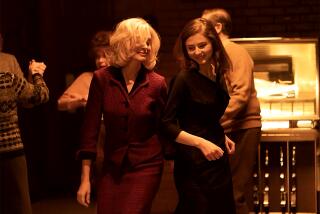Perhaps it’s too novel
- Share via
The actress Anne Hathaway may someday fulfill her costume biopic destiny by assuming the role of her literary namesake, Shakespeare’s wife, but in “Becoming Jane,” she takes on the far more daunting task of playing Jane Austen. Few writers enjoy a following as loyal or fervid or frankly well-organized as Austen’s, and it’s hard to imagine her fans not coming after “Becoming Jane” director Julian Jarrold and screenwriters Sarah Williams and Kevin Hood with pitchforks and torches, or at the very least a letter-writing campaign.
Loosely based on Jon Spence’s biography “Becoming Jane Austen,” their imaginative version of the beloved author’s life seizes on Spence’s theory that Austen may have once been in love with a young Irish law student named Tom Lefroy and basically goes to town with it. The film is a work of fiction -- the press materials make this abundantly clear, mostly through the liberal use of italics (the film was inspired by “the possibility of a fervid romance” and “the thrilling notion of Jane Austen in the middle of her own heated, rebellious love story,” etc., etc.) -- but as such it’s neither very original nor very convincing. “Shakespeare in Love” did something similar by casting its writer protagonist as the hero of a story he himself might have written, but “Becoming Jane” lacks that movie’s wit and playfulness.
For one thing, the film’s characters line up so neatly with Austen’s characters that they can’t help but come off as impostors. Mr. And Mrs. Austen, played by James Cromwell and Julie Walters, echo Mr. and Mrs. Bennett’s indulgent papa and mother goose routine, down to Mrs. Bennett’s obsession that Jane marry as quickly and as rich as possible. Maggie Smith appears as the fictional Lady Gresham, a very slight variation on the snobbish Lady Catherine de Bourgh, whose beloved nephew Mr. Wisley (Laurence Fox), recalls several of the prigs and bores that Austen’s heroines are always being impelled to marry.
Wisley and his aunt apparently are entirely fictional, while the dashing Tom Lefroy (played by James McAvoy) was in fact real and acquainted with Jane. A young Irish law student at the time they met, Lefroy may have flirted with Austen and, according to Spence, possibly let her down. But the filmmakers seemed to want to cast a story better suited to the melancholy mood of “Persuasion” in the effervescent tone of “Pride and Prejudice,” giving it much the same sassy makeover Fanny Price got in Patricia Rozema’s adaptation of “Mansfield Park.”
A little of this, a little . . .
The mixing of vague historical anecdote and pure Hollywood fantasy don’t quite mix, possibly because the subject of the anecdotes is such an object of fascination. Watching “Becoming Jane” feels like watching the filmmakers try to squeeze one last Austen adaptation out of a maddeningly limited oeuvre. It’s true five of the six novels have been adapted and re-adapted to death, but, hey, there’s always “Northanger Abbey.”
The movie begins at a church service, where Jane listens to her father deliver a sermon explaining why wit is a treacherous talent in women. Undaunted, she continues to mulishly rebuff the stiff and lurking Mr. Wisley and dream of living by her pen. If Jane is predisposed not to want to marry Wisley at the start of the film, all bets are off when the dashing Mr. Lefroy, whom we first spy shirtless and socking a rival in a gloveless boxing match, enters the picture. This being Austen, as well as a costume rom-com of sorts, the pair dislike each other at first sight. She thinks him an arrogant, dandified libertine; he thinks her a provincial, sophomoric country mouse. Sparks fly, naturally.
McAvoy is charming, if a little over the top, as the irresistible Regency cad. Handsome, witty, charming, feckless and penniless, he is Mssrs. Wickham, Willoughby and Elton rolled into one -- though, in trying to fashion, if not a happy ending, then at least a reasonably satisfying one out of an outcome that would have been unthinkable in one of Austen’s novels, “Becoming Jane” ultimately deprives him of his caddishness.
Visually, “Becoming Jane” falls somewhere between “Emma” and “Persuasion” in terms of its faithfulness to Regency-era hygiene and lifestyle, though it edges nearer to “Clueless” when it comes to sex. A scene that takes place in the hedges feels particularly pretty daring for the times and the person in question. But it’s nothing compared with the scene in the library. “Is this conduct common in the natural history of Hampshire?” a naughty Mr. Lefroy asks a flustered Jane after reading to her from a naturalist tome she had primly recommended in which the mating rituals of birds are described in Penthouse Forum-ish terms.
There’s nothing really wrong with Hathaway’s performance, but the movie tries to cast her as one of Austen’s own feisty heroines, and she doesn’t quite measure up. Keira Knightley, Kate Winslet, Gwyneth Paltrow and Alicia Silverstone have all evinced more spark and wit than the earnest, straightforward Hathaway.
Austen died at 41 without ever having married, so it falls on “Becoming Jane” not only to invent a great passion for her from flimsy whole cloth, but also to explain its demise in a satisfyingly nonhumiliating way as well. While Spence seems to suggest that Austen’s brief flirtation ended in quiet disappointment, the movie invents a melodramatic end of the affair more characteristic of Lydia Bennett than of Lizzie.
More to Read
Only good movies
Get the Indie Focus newsletter, Mark Olsen's weekly guide to the world of cinema.
You may occasionally receive promotional content from the Los Angeles Times.







